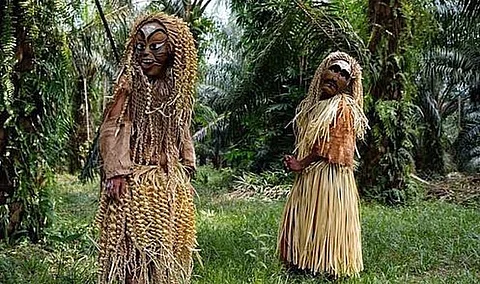
- Destinations
- Experiences
- Stay
- What's new
- Celebrating People
- Responsible Tourism
- CampaignsCampaigns
- SubscribeSubscribe
- Buy Now

Mah Meri Tribe of Malaysia | Indigenous masks possess deep symbolic significance, often embodying a range of elements such as spirits, animals, deities, and ancestral figures. These intricately designed artifacts are integral to ceremonies, rituals, and theatrical performances, serving as powerful tools for connecting with the supernatural realm while reinforcing social structures and cultural identity within communities.
In Malaysia, the Mah Meri tribe stands out for their craftsmanship in carving wooden masks and statues. These creations are not simply artistic expressions; they play a crucial role in preserving and transmitting their cultural heritage. The masks and statues are predominantly utilised during significant rituals and ceremonies, including funeral rites, fertility celebrations, and as offerings to honour the deceased.
The Mah Meri tribe of Malaysia has a rich maritime history as seafarers who originally settled along the coast of Selangor. Their artistry and traditional practices reflect their deep connections to both land and sea, highlighting the importance of their surroundings in shaping their cultural expressions. Each mask and statue is imbued with stories and ancestral wisdom, serving as a vital connection to their past and a means of educating future generations about their identity, beliefs, and values. Through these rituals and the use of masks, the Mah Meri not only celebrate their heritage but also cultivate a sense of community and continuity in an ever-changing world.
The wooden masks and statues crafted by the Mah Meri tribe in Malaysia are not merely artistic creations; they are integral to the cultural identity and heritage of the community. These intricate works of art serve vital roles in various traditional ceremonies, such as those associated with death, fertility, and harvest. Through the use of masks, the Mah Meri engage in spiritual practices that establish a profound connection with their ancestors and the spirit world, reinforcing their beliefs and traditions.
Masks hold a particularly esteemed place in key rituals, such as the puja pantai (beach ritual), a significant event that aims to honour the spirits of the sea and thank them for their bounty. During this ceremony, the masks are believed to serve as vessels for ancestral spirits, allowing the living to engage with and invoke the wisdom of their forebears. This direct communication with the spirit world not only reinforces communal bonds but also empowers individuals to seek guidance and blessings for their daily lives.
The masks themselves are rich in visual symbolism, featuring distinct designs that reflect the Mah Meri’s history, beliefs, and relationship with the natural world. Each wood carved, handmade mask in Malaysia tells a story, depicting elements such as local wildlife, ancestral figures, and significant cultural narratives. Through these intricate representations, the Mah Meri tribe conveys their understanding of the world around them, using art as a medium to communicate their history, morals, and environmental awareness. This form of visual storytelling invites viewers to engage with the deep-rooted significance of each piece, fostering appreciation for the tribe's artistry and cultural legacy.
The artistry involved in carving these Malaysian wooden masks, passed down through generations, plays a crucial role in preserving the Mah Meri's traditional knowledge and folklore. Each mask embodies unique stories, teachings, and life lessons, which are imparted to younger generations through hands-on learning and storytelling. This practice not only ensures the continuation of their cultural heritage but also fosters a sense of identity and belonging among community members.
